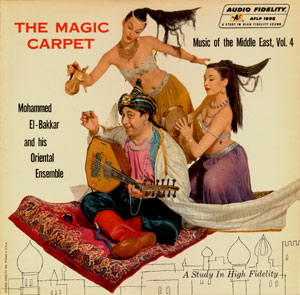|
|||||
|
|
|||||
| Ride a magic carpet to the Middle East, strange, exotic, restless, intriguing as it was 2,000 years ago before its cities were ravaged by the hordes of Genghis Khan, only to be rebuilt with more splendor than ever. Everywhere , from Aleppo to Basra, from Cairo to the Persian Gulf, adventure beckons in every direction. Dark men in turbans, women in dejllaba (head covering), their eyes the only uncovered portion of their seductive bodies, sheiks and beggars, princes and merchants, desert wanderers and urban dwellers--all contribute to an air of mystery and romance.
Everything weaves a magic spell around you—the people, the sights, the sounds, the smells. Everywhere the air is filled with spiced, oriental aromas. Public places are thronged with gowned Arabs, turbaned Kurds, teeming with life as far as the eye can see and the ear can hear. The land has a characteristic smell--a dry, pungent mixture of tobacco, earth and scented smoke. One cannot help being animated by an insatiable desire for pleasure and excitement, for experiences and sensations touched with beauty and passion. Like his Grecian ancestors, the Arab believes in living for the moment. The Middle East is a world of enchanting moods, and no one has succeeded in catching and projecting these moods with as much fever-heat and effectiveness as Mohammed El-Bakkar, one of the outstanding musicians of the Orient and a leading authority on Middle Eastern music. Bakkar combines an exhaustive knowledge of the structure, theory and practical performance of this music with a connoisseur's appreciation of the oriental counterpart of wine, women and song. Here aided by the infinite subtleties of sound captured through guaranteed total frequency range recording, he succeeds in extracting the authentic flavor of Arabian music, especially the earthy quality found in vocal selections. For the most part, Middle Eastern music is entwined with the life of the people. Its instrumental forms are equally as moving as the vocal forms. Both reflect the raw emotions of those who live in desert and urban regions. Aside from minor differences in intensity of expression, a song telling of a dancing girl's unrequited love may be little different from a song about the faithless wife of a bazaar sword swallower. An instrumental dance may have much in common with a piece of composed abstract music. Most Middle Eastern music is very emotional, relatively limited in its pitch range, and extremely free rhythmically. Perhaps its most characteristic reatures are rising and falling pitch and the haunting color of tone achieved through the use of modal scales. In this recording the various selections are typical of songs that can be heard through areas like Morocco, West Africa, Iran, Turkey, Persia and even sections of India. Places like Ali Baba and Sireerie are characteristically and purely Arabian. Cha Cha Pharonic reflects the south American influence coupled with the inimitable flare for oriental style that Mohammed El-Bakkar possesses so naturally. Then there is the Dance of the Nile, and interesting combination of pure Egyptian melody and rhythmic style animated by Bakkar's lively imagination. Nowhere is the atmosphere and mood of the Middle East mirrored more dramatically than in the bazaars, which ramble beside rivers and along the outskirts of cities and towns. Tumultuous with living things of almost every description, the bazaars could not exist without music. On every side incessant strains of song and dance can be heard above the clamor of the crowd. Sometimes it is the sound of a few solo wind instruments, accompanied by voices. Sometimes it is the plaintive whine of a single flute echoing above the cries of hawkers. Sometimes it is an enticing dance tune, and where there are dancing girls inevitably men congregate. Here is the bazaar of the draper. The alcoves are thick with bright fabrics and rolls of material. Nylon slips hang by scores on coathangers. Coats are dull and frocks are flouncy and vividly colored. Amid all his wares the draper sits incongruously cross-legged on a wicker stool. Here is the bazaar of the perfumers, with scores of bottled scents and an overpowering smell of combined stock swirling through the arcades. Here are the food stalls with the myriad of fruit, the thousand and one aromas that combine and recombine as they are wafted through the bazaar by the wind. Here is the leather bazaar with its shoes, pouches, belts, slippers, sandals and dozens of other kinds of articles. Here is the bazaar of the coppersmiths, who bend to their work in the most intense heat, their long-handled hammers crashing on metal in a deafening chorus, their sweaty, glistening faces aglow from the sizzling red coals and molten metal. But the bazaars are not the only attraction that capture the mood of the Middle East. Sometimes it is nothing more than simple physical contrasts, like the deep shadows in and around the mosques or courtyards and the white shafts of sunlight that flood the streets. Sometimes it is the deeply tanned, smooth face of a Bedouin contrasted with the furrowed faces of bearded men who sit hunched over scales weighing out gold and silver. Sometimes it is the incessant movement of humanity that moves about through the streets and market places as compared with the deserted doorways that lead into quiet courtyards. Sometimes it is the astonishing conglomeration of things that exist wherever the eye looks—heaped merchandise, sherbert sellers, rose leaves, cinnamon, saffron, coriander, strange roots and mysterious eastern powders, animals of every description, scented stones, precious and cheap metals carpets and glassware, incense, confections and wine. And now, come. The pleasures of the harem and of the palaces of entertainment call. Take off your shoes and enter the inner sanctum with Mohammed El-Bakkar and his Oriental Ensemble. Prepare to savor the songs and delights of Araby on a Magic Carpet.
|
|||||
|
 |
 |
 |
 |
 |
 |
 |
 |
 |
 |
